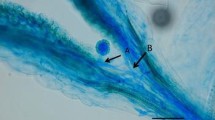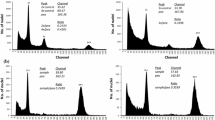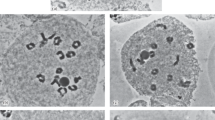Summary
Heat-shocks applied to the pollen mother cells, followed by self-pollination is effective in producing triploids in fruit trees. The method depends upon the sieve-like action of incompatibility on the pollen, allowing only diploid pollen tubes to reach the ovary, although much of the pollen is haploid. Since only pollen grains which carry two differentS genes are compatible the heat-shock must be given before these genes segregate.
By this method triploids have been produced from diploid pears. In diploid cherries, fruits have been obtained, but the seeds were small and inviable. In a self-incompatible plum (2n = 32), fruits and seeds were formed after self-pollination with treated pollen, but the seedlings had the same chromosome number as the parent.
Similar content being viewed by others
References
Crane, M. B. (1943).Endeavour,2, 111–16.
Crane, M. B. &Lewis, D. (1942).J. Genet.43, 31–43.
Crane, M. B. &Zilva, S. S. (1931).J. Pomol.9, 228–31.
Johnstone, F. E. (1939).Amer. Pot. J.16, 288–304.
Levan, A. (1936).Hereditas, Lund.,22, 278–80.
Lewis, D. (1943).J. Genet. (in the Press).
Lewis, D. &Modlibowska, I. (1942).J. Genet.43, 211–22.
Nebel, B. R. &Ruttle, M. L. (1938).Circ. N. Y. St. Agric. Exp. Sta. no. 183.
Nilsson-Ehle, H. (1938).Hereditas, Lund,24, 195–209.
Randolph, L. F. (1932).Proc. Nat. Acad. Sci., Wash.,18, 222–9.
Stout, A. B. &Chandler, C. (1941).Science,94, 118.
Author information
Authors and Affiliations
Rights and permissions
About this article
Cite this article
Lewis, D. The incompatibility sieve for producing polyploids. Journ. of Genetics 45, 261–264 (1943). https://doi.org/10.1007/BF02982968
Issue Date:
DOI: https://doi.org/10.1007/BF02982968




